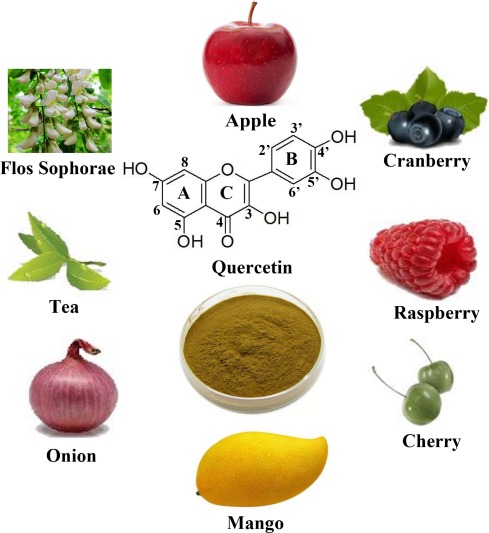Is Quercetin Same As Quinine? No. Quercetin is a phytonutrient whereas quinine is a naturally occurring compound found in cinchona bark and was used as an antimalarial agent. However, both might have zinc ionophore properties i.e. ability to transport zinc into cells.
Quinine, a naturally occurring compound found in cinchona bark, was first recognized as a potent antimalarial agent hundreds of years ago. Since then, the beneficial effects of quinine and its more advanced synthetic forms, chloroquine and hydroxychloroquine, have been increasingly recognized in a myriad of other diseases in addition to malaria.
Historically, hydroxychloroquine was discovered during efforts to synthesise alternatives to quinine as anti-malarials. Hydroxychloroquine, developed in the 1950s from chloroquine, an old anti-malarial drug, is registered in around 60 countries under trade names such as Plaquenil, Quensyl and Plaquinol.
Hydroxychloroquine,
Chloroquine, Quinine, Quercetin and EGCG (EpiGalloCatechin Gallate) are all zinc ionophores. Meaning they all transport zinc into the cells.
Quercetin and COVID-19
Quercetin and zinc are part of the
FLCCC and Zelenko protocols for the prevention and early treatment of COVID-19. As of April 2024, there have been more than 10 published studies of quercetin against COVID-19. For the list of studies, check out
c19quercetin.com.
Quercetin acts as a zinc ionophore (
PubMed 2014), the same mechanism of action that hydroxychloroquine has via helping zinc pass the cell wall where it might halt viral replication.
This zinc ionophore activity of quercetin facilitates the transport of zinc across the cell membrane. It is known that zinc will slow down the replication of coronavirus through inhibition of enzyme RNA polymerase (
PubMed 2010). The COVID-19 is an
RNA (RiboNucleicAcid) virus and requires the
RNA polymerase to replicate. Do take note that the study publication was a 2010 publication and is referring to a different coronavirus as compared to the latest coronavirus (COVID-19); though both are from the same family of coronaviruses.
An animal study published in the
Nature (Aug 2012), concluded that quercetin has anti-oxidant, anti-inflammatory and
anti-fibrotic (anti-scarring) properties. Another study (
JCI May 2012) on rutin (quercetin molecule bound to a sugar molecule called rutinose), commonly found in fruits and vegetables and sold over the counter as a dietary supplement, has been shown to
inhibit the formation of blood clots in an animal model of thrombosis.
A review published in
The Sage Journal (Dec 2020), summarizes the antiviral significance of quercetin and proposes a possible strategy for the effective utilization of natural polyphenols in our daily diet for the prevention of viral infection.
Quercetin, Zinc and Vitamin C
Incidentally, ascorbic acid (vitamin C) and the bioflavonoid quercetin (originally labeled vitamin P) were both discovered by the same scientist — Nobel prize winner
Albert Szent-Györgyi. Quercetin and vitamin C also act as an antiviral drug, effectively inactivating viruses.
There is evidence that vitamin C and quercetin co-administration exerts a synergistic antiviral action due to overlapping antiviral and immuno-modulatory properties and the capacity of ascorbate to recycle quercetin, increasing its efficacy.
Quercetin works best when taken with vitamin C and Bromelain, as vitamin C helps activate it and bromelain helps with the absorption. In this study (PubMed), Bromelain also has anti-viral property against COVID-19 virus and anti-clotting property, and therefore may be useful against COVID-19.
Caution: Quercetin has one moderate drug interaction with warfarin. Do not take quercetin without medical advice if you are using warfarin (blood thinner).

COVID-19 Early Treatment Options
For an up-to-date overview of all published studies on early treatment and prevention of COVID-19, we recommend visiting
C19Early.
Conclusion
Viral infections like the COVID-19 also put added stress on your body, which can affect your blood pressure, heart rate, and overall heart function. That can raise your probability of having a heart attack or stroke. Therefore, make sure your blood pressure are factors associated with 'co-morbidities' are well controlled during this pandemic.
Aside from supplements and preventive treatments, there are other ways that may help improve immune response and to prevent you from catching the coronavirus.
- Abundant evidence suggests that eating whole in fruits, vegetables and whole grains—all rich in networks of naturally occurring antioxidants and their helper molecules—provides protection against free radicals.
- Getting Enough Sleep
- Avoid Sugar, red meat and processed foods.
- Don't smoke.
- Take steps to avoid infection, such as washing your hands frequently and cooking meats thoroughly.
- Try to minimize stress.
- Drink enough water to keep your body hydrated.
- Avoid excess alcohol.
- Avoid crowded areas.
- Follow local guidelines.
- Consult your nearest local healthcare provider if you have any doubt.
Disclaimer: The information on this website is not intended to replace a one-on-one relationship with a qualified health care professional and is not intended as medical advice. It is intended as a sharing of knowledge and information from the research and experience of third party sites. If you are pregnant, nursing, taking medication, or have a medical condition, consult your health care professional before using products based on this content.

.png)

.png)






Comments
Post a Comment